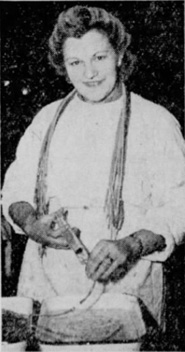Miles Enters Town Soon After Capture
By FRANK MILES
(Iowa Daily Press War Correspondent)
With the Fifth Army in Italy, (IDPA) -- I was one of the first of 3 war correspondents to enter the town of Firenzuola after it had been captured by Americans. It was from there, 5 days later earlier that nazi gunners hurled shells at a bull dozer under which T/5 Zacheus Stemm, of Lucas, Iowa, another scribe, a jeep driver, a tanks corpsman and the writer rolled for safety.
When I left I wondered what might happen to Stemm and his 3 comrades, who were in the tank when we arrived. Later I learned that they were again bombarded, so hotly they had to leave their machine and run around a mountainside to safety.
Firenzuola is now a mass of ruins. Every building in it was wrecked by the cross fire of American and nazi shells. A stretch of road over which we traveled to enter was nicknamed "mad mile" because the nazis from their new position were shelling almost every vehicle that appeared on it. We didn't know that going in but we took a different route going out.
In Firenzuola I met Pvt. Clarence Leeson of Burlington, a stove mechanic, who was calmly on his job near the command post kitchen with scores of American shells going over and a nazi shell occasionally coming back. He had been in the army 28 months, had been overseas since Jan. 1, 1944, and had a year old daughter he had seen once and was eager to see again.
Army censorship won't allow publication of their names until after next of kin have been officially notified but in 2 hospitals I saw 5 wounded Iowans, who had just been brought back from the battle lines.
Three were farmers, another a clerk and one a student in civilian life.
One of the farmers had both legs fractured, another a shattered jaw and the 3rd a gashed stomach.
The student had a mangled left arm and ugly cuts on his face.
Two of the farmers and the clerk were married. One of the farmers had a child. All had parents in Iowa and the single farmer a sweetheart whom he planned to wed. All had come from good homes. All had much to live for and fight for.
Each was cheerful despite pain. Like most of the thousands of other wounded American soldiers not one voiced a word of complaint over his hard luck. The boy who may become blind regretted only that he might not be permitted to return to his outfit and he won't be, an attending doctor said.
Smell of ether in the operating rooms, sight of blood and mud caked youths on stretchers waiting for turns on the table and of suffering men on cots brings the war to a visitor with appalling force. The thought occurred to me that every complacent citizen in American should be compelled to see these victims of the nation's fight for security.
Much as I hate nazi principles, I was pleased to see that German soldiers whom American company first aid men had picked up were being given the same medical care accorded Yankee patients. Most of the Jerries fear abuse when the doctors and nurses first approach them but soon are convinced they are fortunate.
At the 94th Evacuation hospital, one of the most famous overseas, among the surgeons was Capt. Byron Henry Evans, of New York, who was graduated from Washington, Iowa high school, Coe college and the University of Iowa, and who gave as the person to be notified in emergency, Byron S. Henry, an uncle of Des Moines. Among the nurses were Lts. Iris Shurbon of Randolph; Ruthann Lovell, Ottumwa; Alvina Mickels of Panama, and Geneva Taylor of Jefferson and Des Moines, who has a brother, Capt. Vance H. Taylor, a pursuit pilot in Normandy, when she last heard from him.
Pvt. Eugene Rose of Sioux City was an attendant at the 94th.
Source: Mason City Globe-Gazette, November 1, 1944
![]()
IOWAN BUSY
Lieut. Alvina Mickels, army nurse from Panama, Ia., keeps busy with her job of cleaning intravenous tubes for use in surgical operations at an evacuation hospital behind the 5th army front in Italy.
Source: DesMoines Tribune, November 14, 1944 (photo included)
![]()

